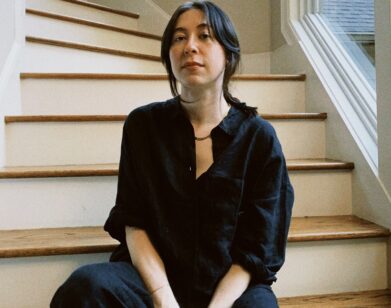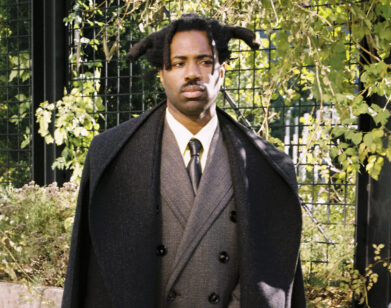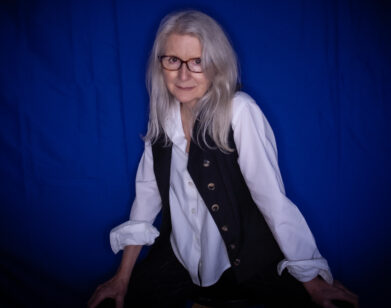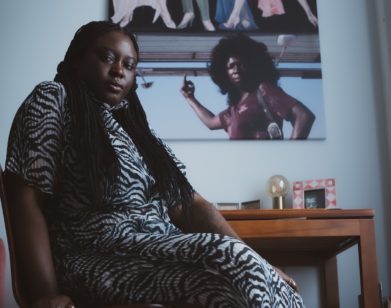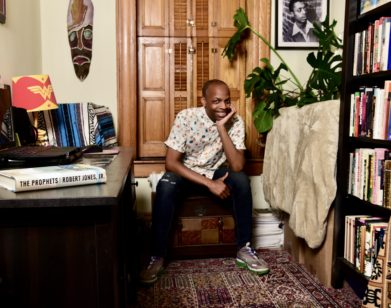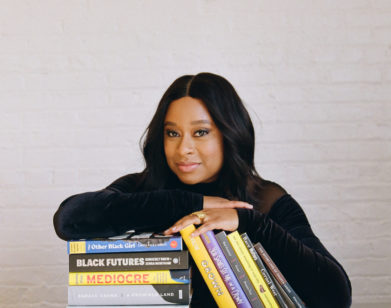rough draft
The Debut Author Jo Hamya Writes as Little as Possible
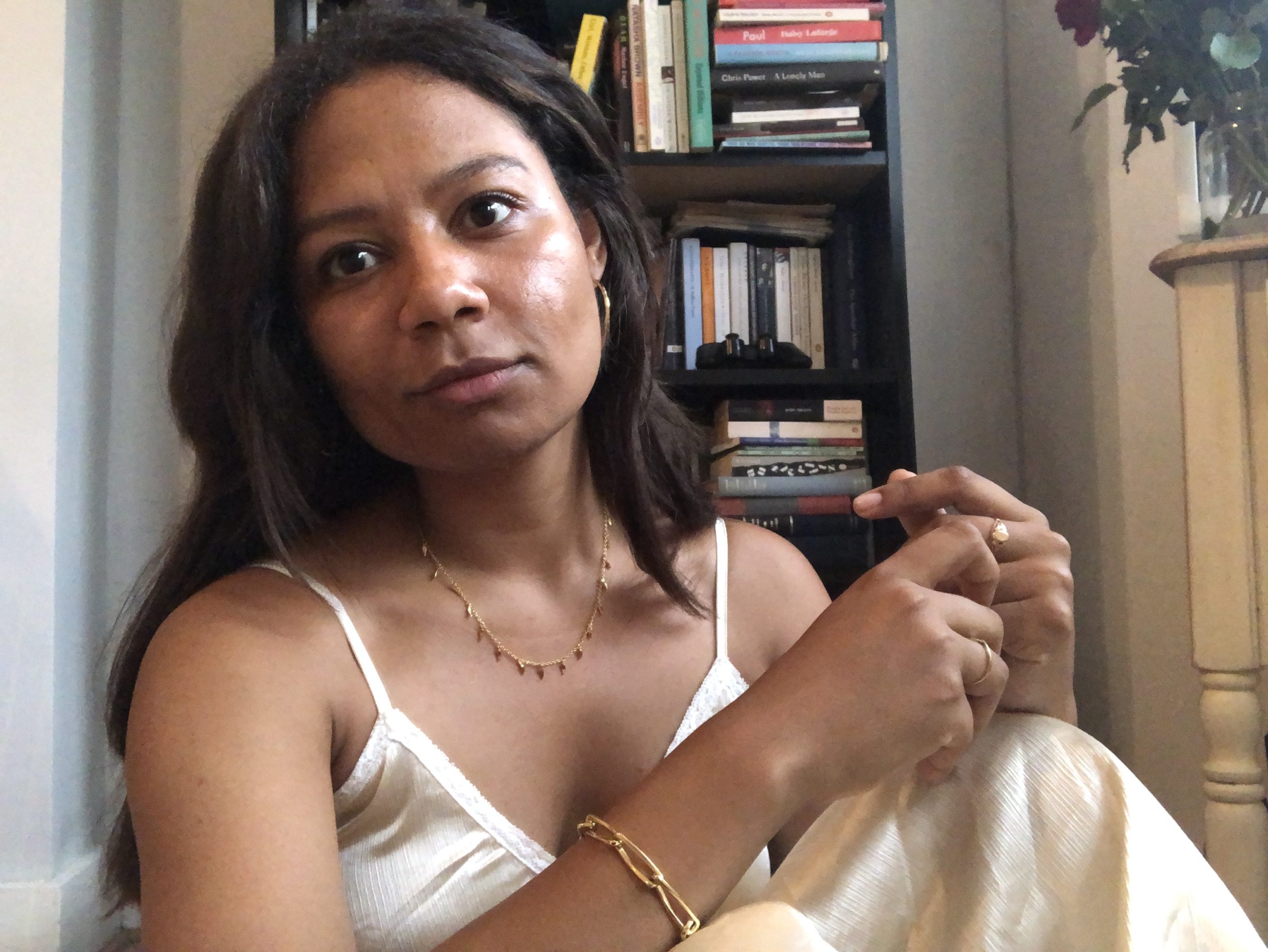
This is Rough Draft, in which our favorite writers get to the bottom of their own craft. From preferred writing drinks to whether or not you really need to carry a notebook, we find out all the ways they beat writer’s block and get it done. This week, we speak with Jo Hamya on the occasion of her debut novel Three Rooms—out today. Inspired by Virginia Woolf’s famous adage, “A woman must have money and a room of one’s own,” the novel follows a young woman through a year spent drifting and couch surfing across the U.K., from a rented room at Oxford to a stranger’s sofa in London, before finally returning to her childhood home. Three Rooms sees Hamya pushing Woolf’s declaration a bit further, posing the question, “In today’s society, who can even afford a room of one’s own?” Below, discover all the elements that helped the author get it done.
———
JULIANA UKIOMOGBE: Describe your ideal writing atmosphere. What gets you in the mood?
JO HAMYA: I find that sort of thing quite indulgent. Mood is an irrelevant fancy if you’ve made a commitment to finishing something. My only real remit is silence, but if I can’t get that, I’ll listen to white noise.
UKIOMOGBE: Do you eat or drink while you write? If so, what do you like to have?
HAMYA: My dad cooked for me while I was writing my first book, and my boyfriend either cooked for me or brought me treats (rose macaroons, custard apples, mangoes, dark chocolate) while I was writing my second one. I’ve been blessed with men who don’t fuss much about the books themselves but are very invested in keeping me going while I write them—which is ideal in terms of efficiency on my end. I’m very lucky. They know I’d just eat £0.005 value peanut butter sandwiches or soup otherwise. Things like cooking drop off my radar during long-term projects.
UKIOMOGBE: Do you ever smoke or drink alcohol while you write? If so, how do you think they impact your writing?
HAMYA: I smoke copiously while I write. To my chagrin. I drink copiously when I’m not writing. To my chagrin. Smoking is a welcome meditative break while writing: I imagine it’s what yoga is meant to do for people without slowly killing them. The drinking happens when not writing: if I were ever so relaxed at work, I’d get nothing done.
UKIOMOGBE: Do you keep a notebook and/or journal?
HAMYA: I keep a personal journal. It’s full of nothing, but it has the same root cause as all my other writing, which is to fill a book-sized thing with thoughts that prove I existed at some particular point in time.
UKIOMOGBE: Do you prefer handwriting or typing?
HAMYA: Typing for work. I don’t let a sentence go until it’s perfect and editing in the moment is easier with a backspace key. Handwriting is for to-do lists and diary entries: it’s better not to have a backspace key for things you care about or have promised to do.
UKIOMOGBE: What’s your favorite quote?
HAMYA: “I think… if it is true that there are as many minds as there are heads, then there are as many kinds of love as there are hearts.” — Leo Tolstoy, Anna Karenina
UKIOMOGBE: Whose writing do you always return to?
HAMYA: Woolf’s, always Woolf’s.
UKIOMOGBE: What’s your favorite book to reread?
HAMYA: Apart from Woolf’s backlist, it’s a sad answer but the books I reread aren’t ones I particularly “love” or think of as “favorites.” I suppose they’re the ones I find most useful. Stuff by Bourdieu, Benjamin, Sontag, Barthes, [Raymond] Williams, Fanon, Kristeva, Didion, Gramsci, Glissant. I have a mild obsession with working out where the idea of cultural ‘value’ in any given (Western, 21st century) context evolves from and those guys do the heavy lifting for me while I sort it out.
UKIOMOGBE: What books did you read as a kid/teen?
HAMYA: As a kid, I loved The Little Prince. I used to reread it every year on my birthday. There was also a picture book my mother used to read to me called Peace At Last and I memorized all the words to make sure she never skipped a page. That might have been my first-time “reading.” Generally, I was a loser, so a lot of the reading I did punched above my weight. I tried Shakespeare and Dickens age nine, I tried Woolf at 14. None of it stuck until I came back to it around 17, or later at university. I do remember some classics getting through properly on the first try though: Pnin at 15, Tolstoy, Dostoyevsky, Austen, and Bronte at 16. Russians and romances, which are probably ideal in temperament for teens. I was a ’00s child as well, so there was a lot of Roald Dahl, Harry Potter, and Enid Blyton, too. And I was passionate about Zadie Smith in my late teens.
UKIOMOGBE: Have your thoughts about those writers changed?
HAMYA: Naturally, some of the children’s writers I mentioned have since been, quote-unquote, canceled. That impacts the memories, inevitably. You think, “I loved this book, but…” I’m now thinking of having a kid and rather than seeking out pregnancy manuals, I’m gravitating to writers I never read as a child but might like for my own. Tove Jansson, for example. I do wonder whether the ones above don’t occur to me out of obviousness or out of bitter association. As for the classics I understood then, or even just the ones I attempted, they’re probably the foundation I’ll work off forever.
UKIOMOGBE: Do you read while you’re in the process of writing?
HAMYA: I read poetry, mainly. My usual frustration with English prose is the potential flatness of how it sounds. Poetry helps to get around that. And I listen to music. Three Rooms was a lot of Benjamin Clementine, Sampha, and St. Vincent. My new book was a lot of Laura Marling, Leonard Cohen, and Max Richter.
UKIOMOGBE: Which writers inform your current work the most?
HAMYA: Rachel Cusk. I had a real problem in other people’s books with reading stilted dialogue forever ending in “he said,” “she said,” or dull, long bits writing to describe character: “her skin was like the moon,” or whatever. Things you never consciously focus on in real life. I found the experience of reading prose very fake, or tiresome before the Outline trilogy came along. Cusk gave me a style guide on how to write fluidly.
UKIOMOGBE: How many drafts of one piece do you typically write?
HAMYA: I wish I could say more than one or two. Recently my agent has cajoled me into four, which is a personal record.
UKIOMOGBE: What would the title of your memoir be?
HAMYA: I’m too young to answer that. Ask me again in forty years.
UKIOMOGBE: Who’s your favorite screenwriter?
HAMYA: I’m rubbish at choosing just one of something: Steve McQueen and Sally Potter is probably the narrowest list I can give.
UKIOMOGBE: Do you consider writing to be a spiritual practice?
HAMYA: Absolutely fucking not.
UKIOMOGBE: Which writers would you choose to have dinner with, living or dead?
HAMYA: I’m of the opinion that having more than one writer in any given situation is a mistake. Writers are, by the necessity of their work, bad dinner party people: their social instinct is intake rather than output. I’d invite musicians: Nick Cave and Warren Ellis being the top of the list.
UKIOMOGBE: What advice do you have for people who want to be better writers?
HAMYA: I think I’m too young to hand out advice, but it would probably be “go out more.”
UKIOMOGBE: What are some unconventional techniques you stand by?
HAMYA: In terms of writing—write as little as possible. In the first place, you’ll only ever have something worth writing if you live a life of some kind of interest (or at least observe something of the kind), and the inherent conditions of getting work done—isolation, self-involvement—are boring. I also think continuous writing risks monotony: falling into habits of style or content. Long breaks in-between mean you have to learn how to do it all over again when you come back to it, and hopefully, that means you do something different the next time.
UKIOMOGBE: Can great writing save the world?
HAMYA: Rhetoric probably could, just as well as it has destroyed it. I suppose writing can fall within that category. But my instinct is to answer “no.”

